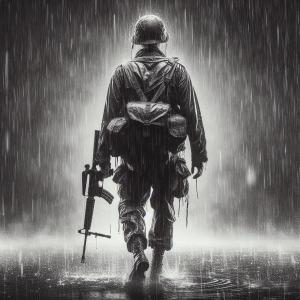
This story deeply touched my heart. It was written by my son, a U.S. Army veteran diagnosed with PTSD:
Perspective
By Joseph Haynes
From the Perspective of the 7-Year-Old
Daddy is like two different people. Sometimes he’s the fun Daddy who builds forts in the living room and lets me help him fix stuff. I like that Daddy the best because he laughs, and his laugh makes me laugh too. He teaches me things, like how to hold a hammer or tie knots like a soldier. But other times, Daddy gets really quiet, like he’s not even here.
When he’s quiet, it feels weird in the house, like when the power goes out, and it’s too still. I don’t like those days. I try to talk to him, but he just looks at me and says, “Not now, kiddo.” He never yells at me, but I can tell he’s mad. Not at me, though. I think he’s mad at himself or something else I can’t see.
One time, I asked him if we could play catch, and he said, “Maybe later.” But later never came because he sat on the couch all day staring at the floor. I told Mommy, and she said, “Daddy’s having a hard day. Let’s give him space.” I don’t know what a “hard day” means. It’s not like he’s at war anymore, right?
At night, I hear him yell in his sleep. Sometimes he wakes up crying. That’s when Mommy hugs him and whispers things I can’t hear. I wish I could help, but I don’t know how. I just know that even when Daddy’s quiet or mad or sad, he still loves me. He tells me all the time. “You’re my world, kiddo,” he says. I believe him.
From the Perspective of the 5-Year-Old
Daddy’s my hero. He used to be a soldier, and soldiers are the bravest people in the world. He tells me stories about when he was in the Army, like how he drove big trucks and helped his friends. I like when he tells those stories because his voice gets all strong, like he’s proud of himself.
But sometimes, Daddy gets mad. Not at me—at stuff. Like the day he couldn’t find his keys, and he banged the counter really loud. It made my tummy feel funny, like I did something wrong, but I didn’t. Mommy told me, “Daddy’s not mad at you. He’s just frustrated.” I don’t know what frustrated means, but it still felt scary.
When Daddy’s sad, he doesn’t play with me. I try to make him laugh by doing silly dances, but he just smiles a little and says, “You’re a goofball.” Then he goes back to being quiet. I think he’s tired a lot. Mommy says soldiers have big feelings they don’t always know what to do with.
I don’t like when Daddy’s mad or sad. I like when he plays with me and calls me “tough guy.” I always tell him, “You’re my favorite person ever,” and that makes him smile for real.
From the Perspective of the Wife
There are days I barely recognize the man I married. Before the war, he was so full of life—quick to laugh, always up for an adventure. Now, it feels like every day is a battle, and some days he loses.
The anger is the hardest part. He doesn’t direct it at me or the kids, but it’s there, simmering under the surface. It comes out in slammed doors, sharp words, or the way his jaw clenches when something doesn’t go right. The boys don’t understand it, and honestly, I don’t always either.
I see how hard he tries. He goes to therapy, takes his meds, does everything he’s supposed to. But the bad days still come. On those days, I feel like I’m carrying the whole family on my back, tiptoeing around his moods, trying to shield the boys from the worst of it.
But then there are moments that remind me why I stay. When he wrestles with the boys in the yard, laughing like he used to. When he apologizes after a bad day, holding me like I’m the only thing keeping him steady. When he looks at our kids like they’re his whole world. I know he loves us more than anything, even if he doesn’t always know how to show it.
It’s hard, living with his pain. But I love him. I love the man he was, and the man he’s trying to be.
From the Perspective of the Veteran, Dad
I love my family more than anything in this world. They’re the only reason I get out of bed some mornings, the only reason I’m still fighting this battle inside my head.
But God, it’s hard. Some days, it feels like my mind is a warzone I can’t escape. The smallest things set me off—a loud noise, a messy kitchen, losing my keys. I know it’s stupid, but when the anger comes, it’s like I’m not in control anymore. I hate myself for it.
I see the way my boys look at me when I’m quiet or mad. They don’t say anything, but I can see the confusion, the hurt. I try to explain it to them, but how do you tell a 7-year-old and a 5-year-old that their dad’s brain is broken in ways they can’t understand?
And my wife—God bless her. She’s my anchor, even when I feel like I’m dragging her down with me. She deserves better than a man who sometimes forgets to ask how her day was because he’s too stuck in his own head. But she stays. She loves me, even when I can’t love myself.
I go to therapy. I take the meds. I do everything I’m supposed to. Some days it helps. Some days it doesn’t. But as long as my boys hug me tight and tell me they love me, as long as my wife holds my hand and tells me, “We’ll get through this,” I know I can keep going.
They’re my reason for everything. As long as they love me, I’ll keep trying.
______________________________________________________________________
“Post traumatic stress disorder (PTSD) is a significant concern among military personnel and first responders, who are often exposed to traumatic events in the line of duty. While about 6% of U.S. adults are diagnosed with PTSD, that number jumps to 15% for paramedics and over 23% for military service members.
“Understanding how common PTSD is within these groups is crucial for developing effective support systems and interventions. Moreover, the prevalence of PTSD among these populations highlights the need for ongoing research, targeted mental health services, and increased awareness to ensure those affected receive the help they need (AFBA).
God bless you, and God bless all who serve or have served.













